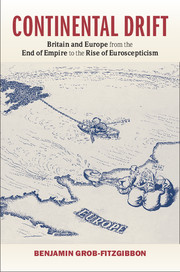Book contents
- Frontmatter
- Dedication
- Contents
- Acknowledgements
- List of abbreviations
- Introduction
- Part 1 Imperial Europeans
- 1 A world undone
- 2 Mr Churchill's Europe
- 3 Mr Bevin's response
- 4 The German problem
- 5 A disunited Europe?
- 6 The continental surprise and the fall of the Labour government
- 7 The realities of government
- 8 Perfidious Gaul
- 9 The decline and fall of the imperial Europeans
- Part 2 Post-imperial Eurosceptics
- Conclusion: Post-imperial Britain and the rise of Euroscepticism
- Notes
- Bibliography
- Index
7 - The realities of government
from Part 1 - Imperial Europeans
Published online by Cambridge University Press: 05 May 2016
- Frontmatter
- Dedication
- Contents
- Acknowledgements
- List of abbreviations
- Introduction
- Part 1 Imperial Europeans
- 1 A world undone
- 2 Mr Churchill's Europe
- 3 Mr Bevin's response
- 4 The German problem
- 5 A disunited Europe?
- 6 The continental surprise and the fall of the Labour government
- 7 The realities of government
- 8 Perfidious Gaul
- 9 The decline and fall of the imperial Europeans
- Part 2 Post-imperial Eurosceptics
- Conclusion: Post-imperial Britain and the rise of Euroscepticism
- Notes
- Bibliography
- Index
Summary
The Prime Minister finalised his cabinet in the late hours of 30 October 1951. At its first meeting that day, he made no mention of either the Commonwealth or Europe, instead appointing a committee to begin an ‘urgent’ investigation into how to reverse the Labour government's Iron and Steel Act, which had nationalised the steel industry. He also announced that all ministers would take a reduced salary for three years and suggested that Britain should support Israel in its ongoing dispute with Egypt, the latter having blocked the passage of oil tankers bound for Haifa through the Suez Canal. When the new Foreign Secretary Anthony Eden spoke against this, arguing that it was more important to avoid creating resentment in Egypt and other Arab states than to support Israel, Churchill deferred to his judgment and so the status quo remained in the Middle East. Beyond this brief discussion, there was no further mention of foreign or imperial affairs.
When the cabinet met for the second time, on 1 November, there was again no consideration of Europe or the Commonwealth, its members instead examining the recommendation by the new Chancellor of the Exchequer, R. A. Butler, for a drastic reduction in government expenditure. That evening, when speaking in the House of Commons for the first time as newly re-elected Prime Minister, Churchill called for ‘several years of quiet, steady administration, if only to allow Socialist legislation to reach its full fruition’, and, at the cabinet meeting of 7 November, his only reference to the Empire was to ask Oliver Lyttelton, the new Colonial Secretary, to investigate ways to reduce the cost of the ongoing counter-insurgency operations in Malaya. It was clear that the new government's focus would be on economics rather than foreign policy and that its priority would be to reduce public spending. For a party that, in opposition, had spoken with sweeping rhetoric of grand visions for the world, the first days in government for the Conservatives were marked by a distinct and unambitious pragmatism.
Yet if in his initial weeks as Prime Minister Churchill had been more concerned with reducing the cost of peacetime governance than with foreign policy, for others in the government and civil service Europe, the Empire-Commonwealth and Britain's place in the world more generally were at the forefront of their deliberations.
- Type
- Chapter
- Information
- Continental DriftBritain and Europe from the End of Empire to the Rise of Euroscepticism, pp. 153 - 177Publisher: Cambridge University PressPrint publication year: 2016

